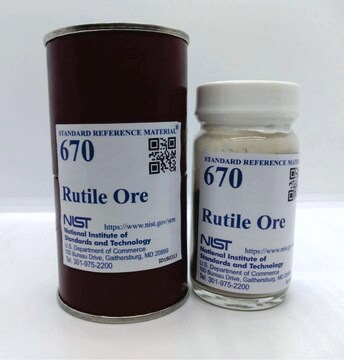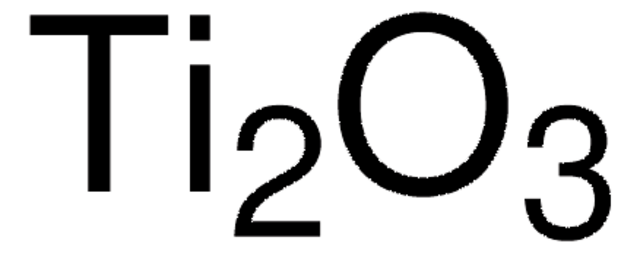635057
Titanium(IV) oxide, rutile
<001>, (single crystal substrate), ≥99.9% trace metals basis, L × W × thickness 10 mm × 10 mm × 0.5 mm
Synonyme(s) :
Titanium dioxide
About This Item
Produits recommandés
Qualité
optical grade
Niveau de qualité
Description
single side polished
Pureté
≥99.9% trace metals basis
Forme
(single crystal substrate)
(single side polished)
Dureté
7 mohs
L × l × épaisseur
10 mm × 10 mm × 0.5 mm
Transmittance
0.5-4.5 μm
Pf
1840 °C
Densité
4.17 g/mL at 25 °C (lit.)
4.26 g/mL at 25 °C
Propriétés du semi-conducteur
<001>
Chaîne SMILES
O=[Ti]=O
InChI
1S/2O.Ti
Clé InChI
GWEVSGVZZGPLCZ-UHFFFAOYSA-N
Vous recherchez des produits similaires ? Visite Guide de comparaison des produits
Caractéristiques et avantages
Propriétés physiques
Forme physique
Code de la classe de stockage
11 - Combustible Solids
Classe de danger pour l'eau (WGK)
nwg
Point d'éclair (°F)
Not applicable
Point d'éclair (°C)
Not applicable
Équipement de protection individuelle
Eyeshields, Gloves, type N95 (US)
Faites votre choix parmi les versions les plus récentes :
Déjà en possession de ce produit ?
Retrouvez la documentation relative aux produits que vous avez récemment achetés dans la Bibliothèque de documents.
Les clients ont également consulté
Articles
Building and Engineering Micro/Nano Architectures of Single-Walled Carbon Nanotubes for Electronic Applications
A hard disk drive (HDD) is a data storage device that stores digital information by magnetizing nanosized magnets on flat disks and retrieves data by sensing the resulting magnetic field.
Nanomaterials are considered a route to the innovations required for large-scale implementation of renewable energy technologies in society to make our life sustainable.
Spin-based electronic (spintronic) devices offer significant improvement to the limits of conventional charge-based memory and logic devices which suffer from high power usage, leakage current, performance saturation, and device complexity.
Notre équipe de scientifiques dispose d'une expérience dans tous les secteurs de la recherche, notamment en sciences de la vie, science des matériaux, synthèse chimique, chromatographie, analyse et dans de nombreux autres domaines..
Contacter notre Service technique


